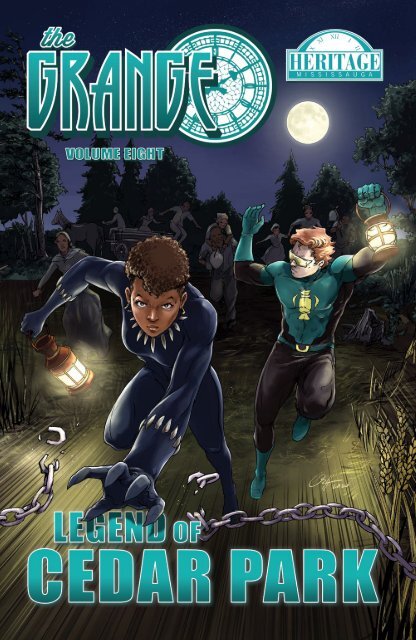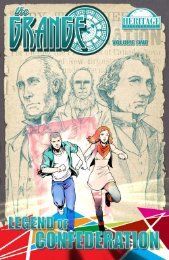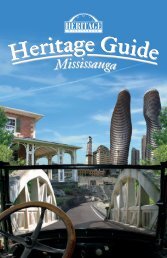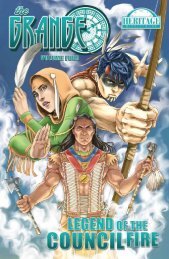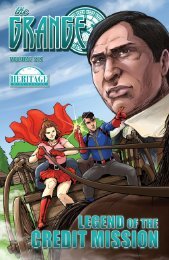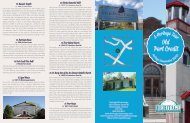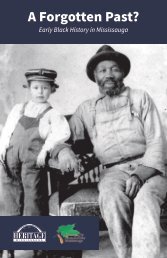The Grange: Legend of Cedar Park
Create successful ePaper yourself
Turn your PDF publications into a flip-book with our unique Google optimized e-Paper software.
John Cabot Catholic Secondary School<br />
How did you talk<br />
me into this summer<br />
school course? It’s so<br />
hard to find local<br />
information on this<br />
project!<br />
Yeah well...<br />
I thought that with<br />
my knowledge <strong>of</strong> Black<br />
History, this would be a<br />
breeze. I didn’t know it<br />
would be this tricky to<br />
find Mississauga<br />
connections.<br />
[Sigh]<br />
All I’ve found is<br />
this historical<br />
atlas.<br />
Hey wait!<br />
I think I found<br />
something!<br />
“A Fugitive Past:<br />
Black History in<br />
Mississauga”<br />
by Erin<br />
Brubacher!<br />
“...Our last<br />
stop is <strong>Cedar</strong> <strong>Park</strong><br />
Farm, formerly at<br />
the intersection <strong>of</strong><br />
Cawthra and<br />
Burnhamthorpe.”<br />
This is it!<br />
keep reading.<br />
“...Perhaps<br />
one <strong>of</strong> the most<br />
economically successful<br />
farms in the area,<br />
<strong>Cedar</strong> <strong>Park</strong> Farm was home<br />
to George Woodford Ross<br />
and his wife Didamia”<br />
It says here<br />
that “<strong>The</strong> origins<br />
<strong>of</strong> George W. Ross<br />
are unclearӉbut<br />
that he came from<br />
Virginia.<br />
Hold up.<br />
Did you say<br />
“George W. Ross”?<br />
His name is right<br />
here on this<br />
atlas!<br />
I wonder<br />
what life<br />
was like<br />
for them.<br />
Is there<br />
even enough<br />
here for our<br />
project?
According<br />
to this atlas,<br />
the Ross’ farm<br />
was right down<br />
the street, at<br />
Rayfield <strong>Park</strong>.<br />
That’s in my<br />
backyard! If only<br />
we had a way to<br />
find more info on<br />
<strong>Cedar</strong> <strong>Park</strong> Farm!<br />
<strong>Cedar</strong> <strong>Park</strong>, eh?<br />
I can take you<br />
somewhere to<br />
learn about it.<br />
A short drive later...<br />
Wait, this<br />
is Streetsville.<br />
Why did you<br />
bring us here?<br />
I promise<br />
there is more<br />
here than meets<br />
the eye.<br />
Go on down<br />
Water Street<br />
to the old town<br />
hall. George can<br />
help you there.<br />
Hurry,<br />
this way,<br />
out <strong>of</strong><br />
the mud!<br />
Whoa!<br />
what’s going<br />
on? Why is<br />
Streetsville<br />
so muddy?
My name<br />
is George<br />
and I’ve been<br />
expecting<br />
you.<br />
Hi, I<br />
am Nala<br />
And I’m<br />
Liam<br />
Sounds<br />
like the<br />
lecture is<br />
about to<br />
start.<br />
OMG...<br />
Look at<br />
the date<br />
on this<br />
sign!<br />
Streetsville, August 1857.<br />
Welcome<br />
friends and<br />
neighbours!<br />
I am Robert<br />
Stephens.<br />
I’m pleased<br />
to introduce<br />
our guest this<br />
afternoon.<br />
He was a free<br />
man, a musician, lured<br />
away with the promise<br />
<strong>of</strong> work, leaving behind<br />
a wife and children, and<br />
sold into slavery<br />
I’m here to<br />
speak on behalf<br />
<strong>of</strong> the abolitionist<br />
movement<br />
He endured<br />
that diabolic<br />
institution for<br />
12 years, before<br />
making his escape<br />
back to<br />
freedom.<br />
Please<br />
welcome<br />
Solomon<br />
Northup.<br />
That’s him!<br />
From the movie<br />
12 Years a<br />
Slave.<br />
Right!<br />
That movie<br />
we went to.<br />
It was<br />
awesome!<br />
and on the<br />
evils <strong>of</strong> slavery<br />
south <strong>of</strong> the<br />
border...
Down<br />
with bloody<br />
Northup!<br />
We will<br />
chase you<br />
down!<br />
Send him<br />
to the<br />
gallows!<br />
This is<br />
not a safe<br />
situation<br />
for us.<br />
Hurry,<br />
out the back<br />
and toward<br />
my hotel.<br />
What<br />
was that<br />
about?!<br />
Intolerance<br />
and a hatred<br />
<strong>of</strong> change.<br />
I must<br />
arrange<br />
safe passage<br />
for Mister<br />
Northup.<br />
Perhaps<br />
your guests<br />
will be safer<br />
elsewhere.<br />
Agreed.<br />
This is<br />
not what we<br />
hope to build<br />
here, but the<br />
old ways are not<br />
far behind.<br />
Come this<br />
way. I have<br />
a wagon at<br />
the stables.<br />
Benjamin, we<br />
must get along,<br />
quickly! An angry<br />
mob is not far<br />
behind.
My apologies,<br />
I didn’t introduce<br />
myself properly.<br />
We are<br />
headed to our<br />
home, where we<br />
can speak in<br />
safety.<br />
I am George<br />
Woodford Ross,<br />
and this is my<br />
son Benjamin.<br />
Are you<br />
alright?<br />
Yes, but<br />
that was<br />
scary.<br />
Those<br />
men were<br />
so angry.<br />
Benjamin Paul, age 21<br />
not everyone<br />
shares in their<br />
sentiment,<br />
though.<br />
Our friends who<br />
support abolition are<br />
gathering at our home<br />
this evening to discuss<br />
an emancipation day<br />
gathering. I want you to<br />
meet and hear what<br />
they have to say.<br />
We are<br />
here.<br />
Welcome<br />
to <strong>Cedar</strong><br />
<strong>Park</strong> Farm.<br />
It’s not<br />
like how<br />
I imagined<br />
it.<br />
I know<br />
about the Black<br />
Settlement <strong>of</strong><br />
Wilberforce<br />
near Lucan,<br />
Ontario,<br />
but<br />
how did<br />
you come<br />
to be<br />
here?<br />
I was<br />
born enslaved<br />
in Virginia in<br />
1796. My Scotish<br />
father, James Ross,<br />
was also our<br />
Master.<br />
Unlike<br />
other stories<br />
<strong>of</strong> slavery, I was<br />
emancipated by<br />
my father in<br />
1802.<br />
From then<br />
on, I trained<br />
to be a<br />
carpenter.<br />
Together<br />
with my brothers,<br />
William and Corbin,<br />
we came to Canada<br />
in 1834. I bought<br />
this land shortly<br />
after.<br />
I named it<br />
<strong>Cedar</strong> <strong>Park</strong> Farm<br />
after my father’s<br />
plantation.<br />
But why<br />
name it<br />
after a place<br />
<strong>of</strong> slavery?<br />
<strong>The</strong>re are<br />
many reasons<br />
for remembering...<br />
and reasons not<br />
to forget.
Who is<br />
that singing<br />
over there?<br />
my way to<br />
on<br />
Canada,<br />
I’m cold and n drea e dreary r y<br />
T h ha<br />
at c<br />
land;<br />
effects <strong>of</strong><br />
dire slavery<br />
T he can longer<br />
I c a<br />
n no longn er stand.<br />
t ndn He is<br />
John Sheppard.<br />
He escaped slavery<br />
and made his way<br />
here by boat,<br />
through Ohio.<br />
We shelter<br />
him here where<br />
he is safe from<br />
fugitive slave<br />
catchers.<br />
Farewell, old master,<br />
Don’t come after me,<br />
I’m on my way to Canada,<br />
W h ere coloured men are free.<br />
Wow, I didn’t<br />
realize slave<br />
catchers came<br />
all the way<br />
to Canada.<br />
welcome<br />
to my home, one<br />
that I proudly<br />
built with my<br />
own hands.<br />
Charles Warburton, age 14<br />
James Woodford,<br />
age 5<br />
Corbin Levi, age 10<br />
Eliza, age 17<br />
Come<br />
meet my wife,<br />
Didamia, and<br />
the rest <strong>of</strong><br />
my family.<br />
Alexander<br />
Campbell, age 2<br />
Didemia Anne, age 9<br />
Celestine Sarah<br />
“Cessa”, age 7<br />
Georgina, age 6 months<br />
Rebecca, age 3<br />
Welcome.<br />
Kate “Mityluu”, age 12
Didamia’s<br />
father, Benjamin<br />
Paul, was reverend<br />
<strong>of</strong> the Wilberforce<br />
Settlement you<br />
spoke <strong>of</strong> earlier.<br />
If you don’t<br />
mind, I would<br />
like to hear<br />
more about<br />
Wilberforce.<br />
Wilberforce<br />
was founded as a<br />
refuge in Canada for<br />
fugitive slaves in 1829,<br />
but it was more than<br />
that. It was one <strong>of</strong> the<br />
first Black colonies<br />
in Canada.<br />
It grew to<br />
include schools,<br />
churches, a sawmill,<br />
and other<br />
industries.<br />
We believed<br />
in education, and<br />
were taught to be<br />
strong and stand<br />
up for our rights.<br />
I became a<br />
school teacher, and<br />
later, even taught my<br />
husband to read and<br />
write. I make certain<br />
that our children<br />
attend school.<br />
But doesn’t<br />
the hatred and<br />
discrimination<br />
that still exist<br />
scare you?<br />
I certainly<br />
worry for the world<br />
that our children will<br />
inherit, but the evils<br />
<strong>of</strong> prejudice will be<br />
washed away in time.<br />
Everyone can<br />
learn a lesson amidst<br />
times <strong>of</strong> darkness, and<br />
understand that the<br />
value <strong>of</strong> people is<br />
not based on their<br />
Even as<br />
colour.<br />
Wilberforce has<br />
faded, others have<br />
grown, including the<br />
Dawn and Buxton<br />
settlements.<br />
It seems<br />
our other guests<br />
have arrived. Let<br />
us convene in the<br />
sitting room.
<strong>The</strong>se<br />
youngsters,<br />
nala and Liam,<br />
are my special<br />
guests.<br />
At Solomon<br />
Northup’s lecture<br />
today, they witnessed<br />
the intolerance<br />
we face.<br />
And what <strong>of</strong><br />
Mr. Northup?<br />
Will he be<br />
attending?<br />
After today’s<br />
events, that is<br />
not likely.<br />
<strong>The</strong>re is<br />
worry they<br />
may come<br />
after him.<br />
there are<br />
stories <strong>of</strong><br />
fugitive slaves<br />
being taken from<br />
the streets <strong>of</strong><br />
Toronto...<br />
which is<br />
dangerously<br />
close to<br />
home.<br />
Charles Willcox<br />
With the<br />
“Fugitive Slave Act<br />
<strong>of</strong> 1850” passed in the<br />
United States, slave<br />
catchers are bolder<br />
than ever before.<br />
And It<br />
poses a danger<br />
to all <strong>of</strong> our<br />
rights and<br />
freedoms.<br />
Regardless<br />
<strong>of</strong> the risk, I would<br />
rather have a day free,<br />
than a week <strong>of</strong> life in<br />
slavery. slavery is the<br />
worst evil that<br />
ever was.<br />
All the<br />
more reason<br />
to provide<br />
what shelter<br />
we can.<br />
This reminds<br />
me <strong>of</strong> the racial<br />
pr<strong>of</strong>iling and<br />
anti-Black racism<br />
initiatives we see<br />
on social media.<br />
Benedict Duncan<br />
I was<br />
a slave in<br />
Maryland for<br />
twenty-eight<br />
years.<br />
I feared <strong>of</strong><br />
being sold, as<br />
my master’s<br />
business was<br />
going<br />
downhill.<br />
I left<br />
and walked one<br />
hundred and<br />
fifty miles <strong>of</strong> the<br />
way to escape.<br />
<strong>The</strong>n,<br />
thankfully,<br />
I made my way<br />
into Canada with<br />
the Underground<br />
Railroad.<br />
Without the<br />
bravery <strong>of</strong> “Conductors”<br />
like “Canada Jim” and<br />
“Moses”, that would<br />
not be possible for<br />
many <strong>of</strong> us.
As your Elected<br />
representative, I<br />
believe the Black<br />
man should have the<br />
same civil rights<br />
and freedoms as<br />
the white man.<br />
It is a<br />
constrained freedom<br />
though. Blacks may<br />
be free, but we have<br />
unequal access to<br />
land and to<br />
<strong>The</strong>re are<br />
representation.<br />
still segregated<br />
schools, churches<br />
and associations.<br />
That cannot be<br />
ignored or<br />
misrepresented.<br />
James Cox Aikins<br />
Elected Representative<br />
<strong>of</strong> Peel County<br />
Thomas Paul<br />
Law student<br />
Ross’ brother-in-law<br />
That is true,<br />
brother, but we are<br />
making steps. You and<br />
I own property and have<br />
a measure <strong>of</strong> prosperity,<br />
while Many others are<br />
shoemakers, carpenters,<br />
blacksmiths and<br />
more.<br />
Like us, some<br />
have been here<br />
for 30 years, laying<br />
the foundations. But<br />
this is only the<br />
beginning <strong>of</strong> a<br />
long journey.<br />
I am<br />
encouraged that<br />
there are now<br />
benevolent literary<br />
and social societies<br />
among us, present<br />
company included,<br />
who support<br />
our cause.<br />
Oh wow,<br />
sounds similar to<br />
organizations like<br />
the Congress <strong>of</strong> Black<br />
Women and the Black<br />
Community Action<br />
Network.<br />
It<br />
helps greatly<br />
that we have a<br />
newspaper like<br />
<strong>The</strong> Provincial<br />
Freeman giving<br />
us Black<br />
settlers a<br />
voice.<br />
It is a voice<br />
we hope to spread<br />
and celebrate with<br />
an Emancipation<br />
Day gathering.<br />
An<br />
emancipation day<br />
gathering feels<br />
like it shares<br />
the spirit <strong>of</strong><br />
Caribana.<br />
On behalf<br />
<strong>of</strong> the Reform<br />
an<br />
Party and the Emancipation<br />
Anti-Slavery Day gathering<br />
Society <strong>of</strong> would give us a<br />
Canada, chance to take to<br />
the podium and speak<br />
on the abolitionist<br />
movement to a<br />
wider audience.
later that evening.<br />
Come, let<br />
us walk. I find<br />
it clears minds<br />
and hearts.<br />
This book<br />
has been a<br />
constant<br />
reminder<br />
for me.<br />
It’s titled<br />
“Uncle Tom’s<br />
Cabin”. Do you<br />
know it?<br />
I do. It<br />
is by abolitionist<br />
Harriet Beecher<br />
Stowe. it was<br />
inspired by the story<br />
<strong>of</strong> Josiah Henson<br />
<strong>of</strong> the Dawn<br />
settlement.<br />
I find the<br />
words within to<br />
be helpful when<br />
my thoughts<br />
turn dark.<br />
To have<br />
a reminder <strong>of</strong> the<br />
world we left behind,<br />
the importance <strong>of</strong><br />
abolishing slavery, and<br />
to have those stories<br />
written down,<br />
it empowers<br />
my spirit.<br />
And it shows,<br />
in your family,<br />
friends, and<br />
this farm.<br />
It is<br />
amazing.
For my children,<br />
it is a place <strong>of</strong><br />
beginning and firm<br />
foundation.<br />
For men like<br />
John Sheppard, it is<br />
a safe haven along the<br />
road to freedom. It is<br />
a place <strong>of</strong> healing and<br />
restoration.<br />
But it is<br />
also a bridge to<br />
our past, roots<br />
that I do not<br />
want my children<br />
to forget.<br />
Yet for others,<br />
unfortunately, it is<br />
a pockmark on the<br />
land, a place they<br />
feel we should<br />
not be.<br />
But we endure<br />
and thrive, encouraged<br />
by people like Charles<br />
Willcox and Robert<br />
Stephens, who welcome<br />
us and what this place<br />
stands for.<br />
For me,<br />
this is my home.<br />
Yet, I will not<br />
forget my first<br />
home either.<br />
We have to<br />
remember the stories,<br />
challenges, and struggles,<br />
even as the land changes<br />
around us. We need to<br />
remember where we<br />
came from.<br />
Please take<br />
this book, as my<br />
gift to you. Take<br />
it and be inspired<br />
to share our<br />
history.
Oh wow...<br />
we are back,<br />
and in Rayfield<br />
park.<br />
We used<br />
to play in that<br />
playground all<br />
the time, but had<br />
no idea where<br />
we really stood.<br />
So, was I<br />
right? Was there<br />
more here than<br />
meets the eye?<br />
Yes! there were<br />
Black Settlers and<br />
abolitionists who<br />
lived and worked,<br />
right here, on this<br />
land.<br />
And<br />
Mississauga<br />
has its own<br />
stories to<br />
tell.<br />
Liam, you<br />
take this. I have it<br />
already and it is a good<br />
book to read. It might<br />
not be a Mississauga<br />
story, but as George<br />
said, it inspired many<br />
who came here.<br />
And as Didamia<br />
said, we can all<br />
learn a lesson<br />
amidst times <strong>of</strong><br />
darkness.
<strong>The</strong><br />
Ross Family<br />
A few early Black families settled<br />
in Historic Mississauga (formerly<br />
Toronto Township). Distance from<br />
the American border and relative<br />
geographic obscurity were incentives.<br />
Those that came included Black<br />
Loyalists, emancipated former slaves,<br />
fugitive slaves and free Blacks looking<br />
for a new home and protection under<br />
British rule. Early census records,<br />
council records, birth, marriage and<br />
death certificates provide a glimpse<br />
into this part <strong>of</strong> our City’s past. Much<br />
<strong>of</strong> this story is sparsely documented,<br />
and photographs are few. Some<br />
fugitive slaves, like Benedict Duncan,<br />
found their way to Canada via the<br />
Underground Railroad.<br />
One <strong>of</strong> the best-documented early<br />
Black families in historic Mississauga<br />
was the Ross family <strong>of</strong> <strong>Cedar</strong> <strong>Park</strong><br />
Farm located today near Rayfield <strong>Park</strong><br />
just <strong>of</strong>f the intersection <strong>of</strong> Cawthra<br />
and Burnhamthorpe roads. George<br />
Woodford Ross (c1796-1878) was<br />
an emancipated former slave from<br />
Urbanna, Virginia. His father and slaveowner<br />
was James Ross, a Scottish-born<br />
land-owner. As the narrative goes,<br />
James emancipated his children, and<br />
three half-brothers (George Woodford,<br />
William Woodford and Corbin Lane), all<br />
came to Canada in the 1830s, adopting<br />
the Ross name: “I, James Ross <strong>of</strong> Town<br />
<strong>of</strong> Urbanna in the County <strong>of</strong> Middlesex,<br />
considering that my mulatto slave,<br />
Mary Woodford (now deceased) and<br />
her daughter, Nancy Woodford, were<br />
the gifts <strong>of</strong> my two good friends, the<br />
late Clement Nicholson and Annie his<br />
wife as by their Deed recorded … DO<br />
EMANCIPATE and SET FREE all the<br />
<strong>of</strong> <strong>Cedar</strong><br />
<strong>Park</strong> Farm<br />
By Nala and Liam<br />
Ross-Cook House, <strong>Cedar</strong> <strong>Park</strong> Farm Built circa 1836 by George Ross, bricked veneer added in 1870s,<br />
purchased by Henry Cook in 1919, and demolished circa 1975.<br />
children <strong>of</strong> the said Mary, to wit, Nancy<br />
Woodford, Frances Woodford, William<br />
Woodford, David Woodford, and George<br />
Woodford …”<br />
In James Ross’ 1825 will, the <strong>Cedar</strong><br />
<strong>Park</strong> Farm plantation in Virginia was<br />
to be divided among the Woodford<br />
children. It is likely that this allowed<br />
George Woodford Ross to come to<br />
Canada and eventually purchase his<br />
own farm here in historic Mississauga.<br />
George’s wife was Didamia Paul - a<br />
school teacher from the historic<br />
Wilberforce Settlement near what<br />
is now London, Ontario. Didamia’s<br />
father, Benjamin Paul, had helped to<br />
establish Wilberforce. George and<br />
Didamia were married in 1834, and<br />
in 1836 purchased a 200-acre farm<br />
in historic Mississauga. <strong>The</strong>y had 11<br />
children, one <strong>of</strong> which (Rebecca) had a<br />
son (Private Wilfred Arthur Winstanley<br />
Cook <strong>of</strong> Cooksville) who served, fought<br />
and fell during the First World War.<br />
During the time that <strong>Cedar</strong> <strong>Park</strong> Farm<br />
existed, Solomon Northup (Twelve<br />
Years a Slave) visited Streetsville in<br />
August <strong>of</strong> 1857. <strong>The</strong> Globe newspaper<br />
recounted the harsh welcome he<br />
received. On the other side advocates<br />
<strong>of</strong> the Anti-Slavery Society <strong>of</strong><br />
Canada were championed by Reform<br />
politicians George Brown <strong>of</strong> <strong>The</strong> Globe,<br />
and local elected Reformer James Cox<br />
Aikins. Another likely supporter was<br />
Charles Willcox, a wealthy local farmer<br />
and family friend <strong>of</strong> the Ross family.<br />
With the growth <strong>of</strong> the abolitionist<br />
movement, interest developed in many<br />
communities to hold Emancipation<br />
Day gatherings to recognize the<br />
freedoms <strong>of</strong> Black people in the British<br />
Empire. <strong>The</strong> legacy <strong>of</strong> Emancipation<br />
day continues with the annual Toronto<br />
Caribbean Festival (Caribana) in<br />
celebration <strong>of</strong> a wider African and<br />
Caribbean diaspora.<br />
Like the historic Anti-Slavery societies,<br />
the formation <strong>of</strong> anti-racist movements<br />
like Black Lives Matters and the<br />
creation <strong>of</strong> the Anti-Racism Directorate<br />
in Toronto serve to uphold civil rights<br />
and freedoms. Others like the Black<br />
Community Action Network (BCAN) in<br />
Peel and the Congress <strong>of</strong> Black Women<br />
(Mississauga Chapter) amongst many<br />
others seek the betterment and social<br />
well-being <strong>of</strong> Blacks in Mississauga by<br />
working to address racial inequalities,<br />
injustices and misrepresentations.<br />
ProQuest Historical Newspapers:<br />
<strong>The</strong> Globe and Mail (1844-2011)<br />
<strong>The</strong> Globe, August 19, 1857, page 2
Founded in 1960, Heritage Mississauga is a not-for-pr<strong>of</strong>it<br />
charity whose focus is researching, recording and<br />
celebrating Mississauga’s vibrant and diverse heritage. Heritage<br />
Mississauga is known for its research programs, publications,<br />
outreach presentations, community<br />
partnerships and unique events.<br />
Located in the historic Robinson-Adamson House, known as<br />
“<strong>The</strong> <strong>Grange</strong>” (built circa 1828), Heritage Mississauga is a<br />
passionate advocate for history and heritage in the City <strong>of</strong><br />
Mississauga.<br />
With the support <strong>of</strong> the City <strong>of</strong> Mississauga, our partners,<br />
members, donors, corporate sponsors and volunteers,<br />
Heritage Mississauga continues to accept the challenge <strong>of</strong><br />
promoting awareness <strong>of</strong> our heritage, and a sense <strong>of</strong> place<br />
and time in our city.<br />
www.heritagemississauga.com


